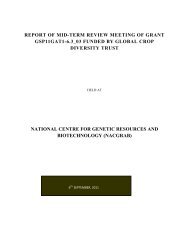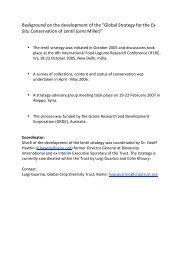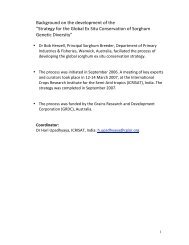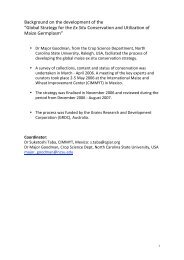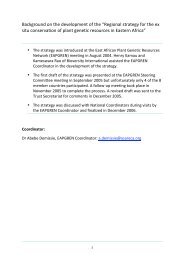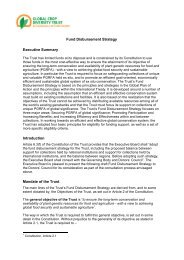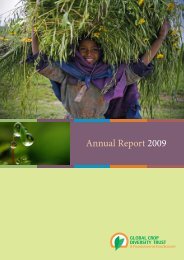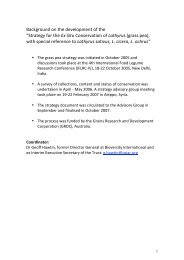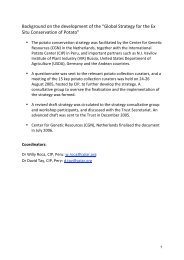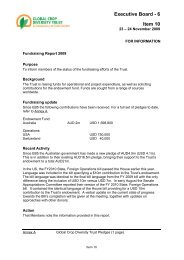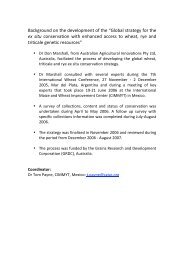Safeguarding the Future of US Agriculture - Global Crop Diversity Trust
Safeguarding the Future of US Agriculture - Global Crop Diversity Trust
Safeguarding the Future of US Agriculture - Global Crop Diversity Trust
Create successful ePaper yourself
Turn your PDF publications into a flip-book with our unique Google optimized e-Paper software.
Rwandan women carrybags <strong>of</strong> bean seedsthrough a war-damagedgrove <strong>of</strong> banana trees.Farmers in this Westernpart <strong>of</strong> Rwanda fled <strong>the</strong>fighting and abandoned<strong>the</strong>ir crops. Genebankscan provide farmers with<strong>the</strong> seeds <strong>the</strong>y need torebuild <strong>the</strong>ir lives.© FAO, G. Dianavarieties. 16 QPM crops are now planted on 400,000 hectares in sub-Saharan Africaand that number could double by 2007.<strong>Crop</strong> Genebanks Healing WoundsThe conservation <strong>of</strong> genetic variation in agriculture crop species is also emergingas an important element <strong>of</strong> recovery and redevelopment following wars andnatural disasters. Most <strong>of</strong> <strong>the</strong> nations that are struggling to recover from <strong>the</strong>devastation <strong>of</strong> military conflicts or natural disasters are relatively poor countrieswhere, for most, life still revolves around agriculture. In <strong>the</strong>se countries, some <strong>of</strong><strong>the</strong> most popular and productive crop varieties are “landraces,” varieties that haveresulted from generations <strong>of</strong> selective breeding by local farmers. These varieties areirreplaceable if lost. But invariably, violence, whe<strong>the</strong>r caused by humans or nature,takes a heavy toll on farming and can result in <strong>the</strong> destruction <strong>of</strong> seed supplies andcrop varieties that have sustained people for centuries.Genebanks have emerged as <strong>the</strong> foundation <strong>of</strong> an efficient and effective means <strong>of</strong>jump-starting a country’s agricultural sector post-conflict or post-disaster. As <strong>the</strong>examples that follow illustrate, <strong>the</strong>y can serve as repositories for conservingindigenous seed and plant material and as resource centers that can provide seedsthat are compatible with a particular ecosystem, diet or culture.After <strong>the</strong> TsunamiThe tsunami <strong>of</strong> December 2004 ravished life, destroyed whole villages, anddamaged <strong>the</strong> coastal environments in several nations. Genebanks have sincecome to aid food production in coastal regions where soil was inundatedwith sand and salt deposited by <strong>the</strong> surging seas. Soon after <strong>the</strong> disasterstruck, <strong>the</strong> International Rice Research Institute (IRRI) began receivingurgent requests from Malaysia and Sri Lanka for salt tolerant varieties <strong>of</strong> rice.Thanks to its long-term commitment to cataloguing and conserving rice fromaround <strong>the</strong> world, IRRI had access to 40 different salt-tolerant varieties. Sixvarieties have already been sent to Sri Lanka and Malaysia and IRRI isworking with local farmers to ei<strong>the</strong>r plant <strong>the</strong>m immediately or use <strong>the</strong>m inbreeding programs to transfer salt-tolerance to local varieties. 17Iraq and <strong>the</strong> Black Box <strong>of</strong> LifeWell before <strong>the</strong> <strong>US</strong> military’s arrival in Iraq in 2003, plant scientists depositeda duplicate <strong>of</strong> a valuable Iraqi seed collection in <strong>the</strong> Syria-basedInternational Center for Agricultural Research in Dry Areas (ICARDA) forsafekeeping. The “black box” <strong>of</strong> seeds held a representative sample <strong>of</strong> Iraq’scritical crop varieties. So, although <strong>the</strong> Iraqi gene bank was later ransackedand looted, <strong>the</strong> rescued seeds were safe in Syria and will be returned to Iraqfor planting. 18 ICARDA is also providing Iraq with additional seeds—20 tons<strong>of</strong> cereal and legume varieties carefully selected for <strong>the</strong>ir genetic suitabilityto Iraq’s growing conditions. 19Bringing Rice Back to CambodiaPlant varieties maintained by IRRI were instrumental in <strong>the</strong> dramatic turnaround<strong>of</strong> Cambodian rice production, which was decimated under <strong>the</strong> rule<strong>of</strong> <strong>the</strong> Khmer Rouge. When <strong>the</strong> Khmer Rouge murdered one quarter <strong>of</strong> <strong>the</strong>population, among <strong>the</strong>ir targets was <strong>the</strong> brain trust <strong>of</strong> <strong>the</strong> country’sSAFEGUARDING THE FUTURE OF U.S. AGRICULTURE 29



